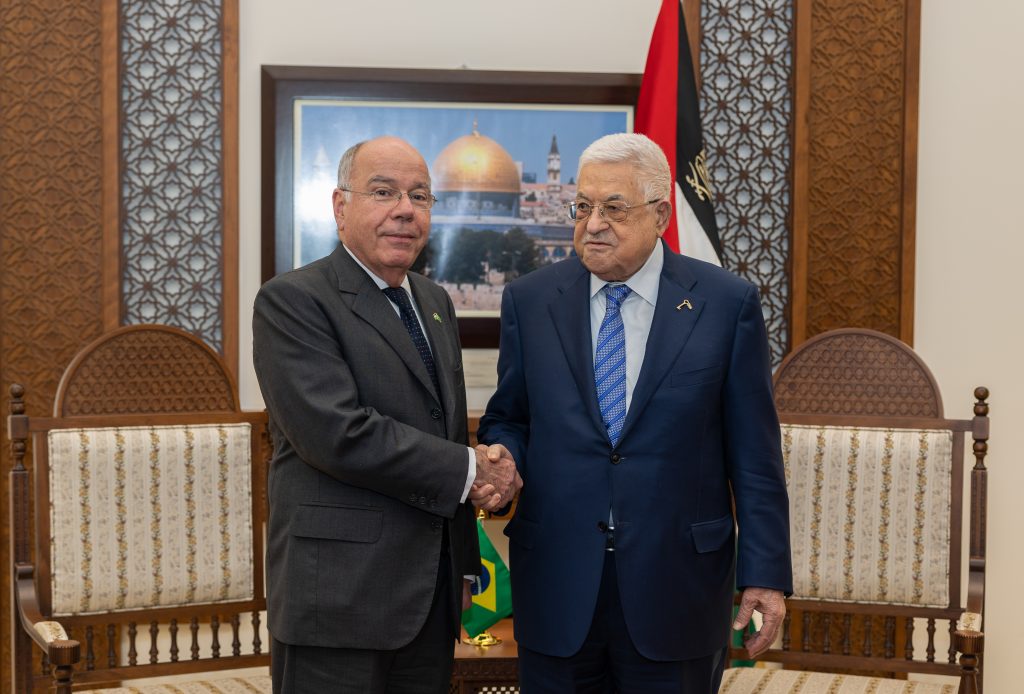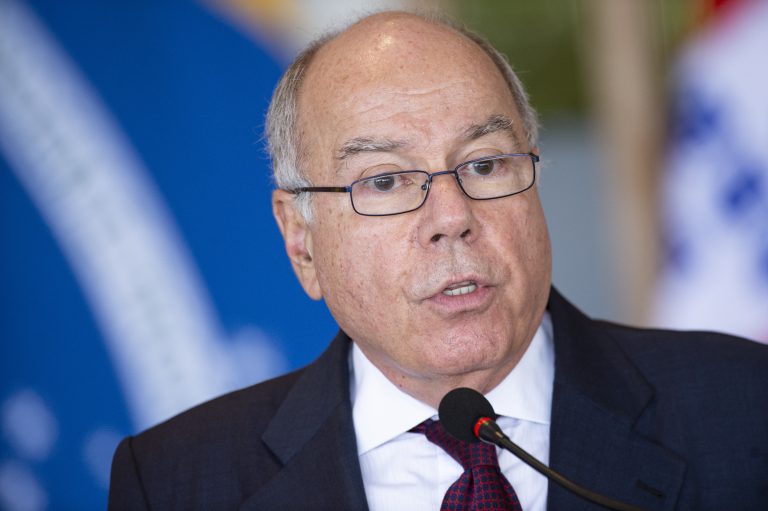São Paulo – Since taking over Brazil’s Ministry of Foreign Affairs for the second time, Mauro Vieira has been in several cities across the globe. As part of his work, he has attended events and meetings in Ethiopia, Egypt, Lebanon, Jordan, the United Arab Emirates, the United States, and Belgium, just to name a few.
A sizable portion of his addresses and meetings has been taken up by the challenge of carrying the message of solving conflicts by means of dialogue. Vieira holds a degree in law from the Fluminense Federal University and graduated from the Brazilian diplomatic academy Rio Branco Institute in 1974 and is an honorary humane letters degree recipient from the Georgetown University in Washington.

Born in Niterói, Rio de Janeiro state, Vieira, 73, previously headed the same ministry from 2015-2016, and among other activities, he was Brazil’s ambassador to Argentina (2004-2010), the US (2010-2015), the United Nations in New York (2016-2020), and Croatia (2020-2022), before he was sworn in again as foreign minister on January 1, 2023, by Brazilian incumbent President Luiz Inácio Lula da Silva.
Vieira has also had recurring appointments in Arab countries, where a major topic – although not the only one – is the conflict in Palestine. In the following interview given to ANBA via email on June 6, Vieira speaks of Brazil-Arab relations, the country’s objectives in its pursuit for two sovereign states in the Middle East – Palestine and Israel – and a potential escalation of his appointments in the Gulf in the second half of the year.
ANBA – You have recently visited Palestine, Lebanon, Jordan, and Saudi Arabia. Could you please comment on what were your impressions when visiting them? Will you return to these or visit other Arab countries in 2024?
Mauro Vieira – In addition to tackling the vast array of bilateral diplomatic appointments, I was amazed by the wide repercussions of Brazil’s positions on the Gaza tragedy. A tragedy caused by human action, it should be said. I was also extremely impressed by how grateful the four countries were by President Lula’s leading role in the debate on the Israeli-Palestinian conflict and the urgent need for attention to civilians in Gaza.
In Palestine, Lebanon and Jordan, I was welcomed by heads of state and government, and all of them, as one, in the same words, expressed their appreciation for the bravery of President Lula and the Brazilian diplomacy by coming out in defense of Palestine’s civilians and the need to restart peace talks in the region aimed at achieving a two-state solution.
Brazil’s diplomatic action towards getting Palestine to be admitted as a full member of the UN and increasing the number of countries that recognize it as a state, has also been highly praised. The leaders I talked to believe engaging heavy-weight countries like Brazil is essential in the effort towards a ceasefire in Gaza, the discussion on the conflict and the pursuit for diplomatic solutions that include the recognition of the Palestinian state throughout the international community.
“The Arab countries and the Asian countries, particularly China and the ASEAN [Association of Southeast Asian Nations], consist of a new frontier that is already a reality when it comes to partnerships.”
Mauro Vieira, Minister of Foreign Affairs of Brazil
Since I returned, the dialogue with the region remains close and will continue to be so in the coming days, as I’m going to Morocco for a bilateral visit on Friday [7].
The following week, I’ll make a bilateral visit to Turkey and join a meeting between the foreign ministers of the BRICS [an organization comprising Brazil, Russia, India, China, South Africa, as well as Ethiopia and fellow new members mentioned below] on the 10th and 11th in Russia, featuring the five new members, including Saudi Arabia, Egypt, the UAE, and Iran. The expanded format of the BRICS also offers an opportunity to further strengthen relations with the new member countries, given that Brazil will preside the organization starting next year.
Palestine is currently going through a conflict that is concerning on several levels, the humanitarian in particular. And Brazilian citizens have recently been hit in Lebanon. What is the path Brazil sees as ideal for an end to the ongoing conflict and long-term peace? And how to walk this path?
The humanitarian dimension is the most dramatic, and history will undoubtedly be unforgiving towards the perpetrators. The first step to take is the cessation of hostilities and the adequate provision of humanitarian aid to civilians in Gaza. Given the tragedy we have witnessed every day since October last year, this is a crucial step, even if admittedly belated.
Any long-term solution should occur within the framework of formulations that have already been agreed upon but never implemented, as is the case with the two-state solutions. And in Brazil’s view, the full recognition of Palestine as a state now and its admission as a full member of the UN are key components for a negotiation to be both successful and sustainable.
There have been major advancements in recent weeks, with votes evidencing a significant support for Palestine both in the Security Country and the UN General Assembly, and now 146 out of 193 UN member countries recognize the State of Palestine. The recent recognition of Palestine as a state by Spain, Norway and Ireland was a relevant progress, I hope, towards more countries, particularly in Europe, to follow their lead.
Read more:
São Paulo-Casablanca flight set to return
In a world where there is a growing reaction against what’s foreign, what do you think of Brazil remaining a country that welcomes people from other nations and allows them to build their lives here? Is this something that makes our country unique?
This positive feature of Brazil is often highlight by my counterparts around the world as a factor qualifying the country to have a foreign policy where dialogue and respect for the international law stand out. In my meetings with major stakeholders from the region, they also highlight the frequent welcoming role Brazil plays by taking in citizens from countries that have faced political turmoil and humanitarian crises. This contribution is greatly appreciated, as well as the recognition for the positions adopted by Brazil in issues like the conflict in Gaza and the humanitarian crisis that’s been dragging on and escalated since October last year.
Many Arab immigrants who arrived in Brazil in the early twentieth century, and most recently sought refugee here, had left their homes due to conflicts. Does Brazil wish to or do play a role intermediating peace agreements?
The role of facilitator or mediator isn’t something to be pursued, as no country can apply to be a mediator. That’s not how it works in international politics. This choice always depends on the parties involved in each conflict. Due to its sensible reputation that it built throughout history, Brazil is constantly mentioned and even asked to play roles as a facilitator, both in Latin America and other regions. We’re always keen to help and play a constructive role, but this always depends on the parties.
In the current global context, how does Brazil see the Arabs in terms of diplomatic partnerships, trade exchange, and investment?
The Arab countries and the Asian countries, particularly China and the ASEAN [Association of Southeast Asian Nations], consist of a new frontier that’s already a reality when it comes to partnerships. The figures of trade and investment growth with these new partners in recent years have already been taken in by both the government’s and private sector’s policymakers and are reflected in an increasingly closer and more fruitful dialogue. The growing number of contacts, trade missions and roadshows involving the Arab countries to lure investments is striking and brings momentum to these relations.
What are the next steps of the government towards the Arab countries?
There are many steps, starting by the connections I’ll maintain in the coming days with different countries in a network that is already denser and more mature, with a prominent role of the private sector. The agenda is expected to step up in the second half of the year, including the possibility of visits to Gulf states.
Translated by Guilherme Miranda




